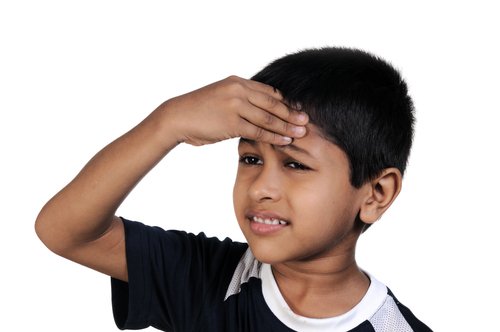Toothaches in Children: What Treatment to Use?

All pain has its degree of anguish, both for the sufferer and for the close relatives who accompany them. Toothaches in children shouldn’t be taken lightly; effective, immediate, and long-term solutions must be found to preserve the health of your children.
While it’s true that there may be home remedies to relieve toothaches in children, it’s important to consider professional care if you see that the problem’s recurrent or the pain is very strong.
Why do toothaches hurt?
The intense pain that occurs in the teeth is due to a nerve that’s been affected. There can be several causes; for example, if your child suffered a strong blow to the lower or upper jaw, that trauma may have moved a tooth or caused a crack. Therefore, there’s some irritation or pressure to the nerve that feeds the tooth.
Another cause may be the presence of tooth decay, which is nothing more than the destruction of dental tissue caused by bacteria that perforates the tooth and affects the nerve.
When any of these conditions mentioned above occurs, it’s likely for the nerve to become inflamed, which causes the intense discomfort that your child feels. Toothaches in children can even be disconcerting for them, as they often radiate to other areas of the body, such as the jaw, neck, glands, or head.
Other causes of toothache in children
There are other factors associated with toothaches in children. While these may not be the cause per se, it’s important to be aware of them, as they can significantly increase the pain.
For example, if they often eat very hard, cold, or hot foods, the enamel of the teeth deteriorates to the point that, over time, the sensitivity of the nerve is much greater. Therefore, the pain is increased.

Also, food debris stuck between the molars can result in very noticeable discomfort. Of course, both circumstances are associated with bad habits and a lack of proper hygiene.
If your children are between 5 and 7 years old, their baby teeth with begin to fall out and their adult teeth will start to come in. It’s likely that the pain is coming from their gums and that’s what’s causing the discomfort, so an analgesic ointment would be appropriate.
On the other hand, if your child is around 16 months old, their first molars will appear. In these cases, a small massage on their gums with a soft brush may be enough, or perhaps biting on a vegetable such as carrots can relieve the pain.
“Toothache may be due to the presence of caries; this is nothing more than the destruction of tooth tissue caused by bacteria that perforates the tooth and affects the nerve.”
Toothache Treatments
Today, you can get a wide variety of medications that will relieve toothache pain in children. Some of them are even issued without medical prescription.
They’re available in different forms: Spray or ointment. However, remember that they’re only to relieve discomfort, so you’ll still have to find out why your child has a toothache. A visit to the dentist will be necessary if the pain persists and also for preventive health.
Measures to take for toothaches in children
There are several measures you can take to relieve toothaches in children. Some of these are as follows:
- You must start by teaching them to have and maintain proper oral hygiene.
- Proper brushing and flossing will depend on your supervision until they learn to do it on their own after every meal.
- Another suggestion is to teach them to do saltwater mouthwashes. This will allow the inflammation to go down and relieve sharp pains.

- A small towel soaked in ginger water will also help; it acts as a natural anti-inflammatory on your jaw.
- An additional, but somewhat difficult, suggestion is to keep the child distracted so that they don’t focus so much on the discomfort.
- If the pain is very acute, there’s no other option but to take them to a specialist.
You should be alert if you notice other symptoms, such as fever or a lump around the affected tooth. Even if you know of another drug, wait for a medical evaluation before administering it.
In conclusion, toothaches in children may be due to different factors. For example, lack of hygiene or the changing of teeth. However, if you take certain measures, you’ll be able to relieve your children from a distressing condition.
All pain has its degree of anguish, both for the sufferer and for the close relatives who accompany them. Toothaches in children shouldn’t be taken lightly; effective, immediate, and long-term solutions must be found to preserve the health of your children.
While it’s true that there may be home remedies to relieve toothaches in children, it’s important to consider professional care if you see that the problem’s recurrent or the pain is very strong.
Why do toothaches hurt?
The intense pain that occurs in the teeth is due to a nerve that’s been affected. There can be several causes; for example, if your child suffered a strong blow to the lower or upper jaw, that trauma may have moved a tooth or caused a crack. Therefore, there’s some irritation or pressure to the nerve that feeds the tooth.
Another cause may be the presence of tooth decay, which is nothing more than the destruction of dental tissue caused by bacteria that perforates the tooth and affects the nerve.
When any of these conditions mentioned above occurs, it’s likely for the nerve to become inflamed, which causes the intense discomfort that your child feels. Toothaches in children can even be disconcerting for them, as they often radiate to other areas of the body, such as the jaw, neck, glands, or head.
Other causes of toothache in children
There are other factors associated with toothaches in children. While these may not be the cause per se, it’s important to be aware of them, as they can significantly increase the pain.
For example, if they often eat very hard, cold, or hot foods, the enamel of the teeth deteriorates to the point that, over time, the sensitivity of the nerve is much greater. Therefore, the pain is increased.

Also, food debris stuck between the molars can result in very noticeable discomfort. Of course, both circumstances are associated with bad habits and a lack of proper hygiene.
If your children are between 5 and 7 years old, their baby teeth with begin to fall out and their adult teeth will start to come in. It’s likely that the pain is coming from their gums and that’s what’s causing the discomfort, so an analgesic ointment would be appropriate.
On the other hand, if your child is around 16 months old, their first molars will appear. In these cases, a small massage on their gums with a soft brush may be enough, or perhaps biting on a vegetable such as carrots can relieve the pain.
“Toothache may be due to the presence of caries; this is nothing more than the destruction of tooth tissue caused by bacteria that perforates the tooth and affects the nerve.”
Toothache Treatments
Today, you can get a wide variety of medications that will relieve toothache pain in children. Some of them are even issued without medical prescription.
They’re available in different forms: Spray or ointment. However, remember that they’re only to relieve discomfort, so you’ll still have to find out why your child has a toothache. A visit to the dentist will be necessary if the pain persists and also for preventive health.
Measures to take for toothaches in children
There are several measures you can take to relieve toothaches in children. Some of these are as follows:
- You must start by teaching them to have and maintain proper oral hygiene.
- Proper brushing and flossing will depend on your supervision until they learn to do it on their own after every meal.
- Another suggestion is to teach them to do saltwater mouthwashes. This will allow the inflammation to go down and relieve sharp pains.

- A small towel soaked in ginger water will also help; it acts as a natural anti-inflammatory on your jaw.
- An additional, but somewhat difficult, suggestion is to keep the child distracted so that they don’t focus so much on the discomfort.
- If the pain is very acute, there’s no other option but to take them to a specialist.
You should be alert if you notice other symptoms, such as fever or a lump around the affected tooth. Even if you know of another drug, wait for a medical evaluation before administering it.
In conclusion, toothaches in children may be due to different factors. For example, lack of hygiene or the changing of teeth. However, if you take certain measures, you’ll be able to relieve your children from a distressing condition.
This text is provided for informational purposes only and does not replace consultation with a professional. If in doubt, consult your specialist.








